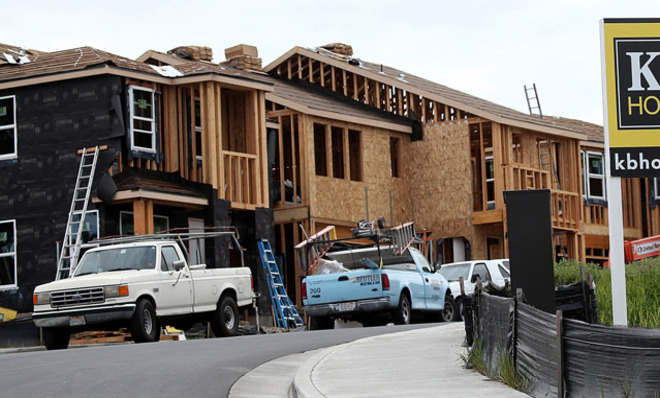Will housing rebound after a woeful winter?
New reports cast doubt on the notion that poor weather has only postponed a year of recovery

A free daily email with the biggest news stories of the day – and the best features from TheWeek.com
You are now subscribed
Your newsletter sign-up was successful

Two new reports on the housing market cast doubt on the general consensus that poor weather has only postponed what is likely to be a year of recovery in the home construction business.
The Commerce Department recently reported that builders had begun building new homes in January at a seasonally adjusted annualized rate of 880,000, down a surprising 16 percent from the previous month. The data came just one day after the National Association of Home Builders found a record decline in confidence in the market among its membership.
Many economists attributed the poor showing in January to extreme winter storm, and most analysts remain cautiously optimistic about a rebound in the housing market.
The Week
Escape your echo chamber. Get the facts behind the news, plus analysis from multiple perspectives.

Sign up for The Week's Free Newsletters
From our morning news briefing to a weekly Good News Newsletter, get the best of The Week delivered directly to your inbox.
From our morning news briefing to a weekly Good News Newsletter, get the best of The Week delivered directly to your inbox.
"January starts suffered due to adverse weather conditions," wrote Patrick Newport and Stephanie Karol, U.S. economists with IHS Global Insights. "Last month was the fifteenth coldest in 120 years, in terms of heating degree days. In the Midwest, the average temperature fell below zero. Most of the drop in starts, both single- and multi-family, occurred in the Midwest."
Newport and Karol said that builders' confidence would be restored once a "pipeline backup" in developed lots and skilled labor eases. "The latest Fed Senior Loan Officer Survey showed that standards continue to ease for construction and land development loans, while demand for this type of financing is getting stronger," they wrote. "We anticipate pipeline pressures will ease over the next two quarters, allowing total housing starts to surpass the one million mark in 2014."
However, some of the findings in the Commerce Department report left other analysts worried about the underlying strength of the market.
"The harsher-than-usual winter weather is a natural culprit, although whether that explains only some, all of, or more than all of the weakening is unclear," wrote Jim O'Sullivan, chief U.S. economist with High Frequency Economics.
A free daily email with the biggest news stories of the day – and the best features from TheWeek.com
"While weather may have contributed to some of the weakness in the January report, some of the regional detail suggests that we should not attribute all of the weakness in the January data to the unusually severe weather," wrote Daniel Silver, an analyst with JPMorgan Chase. "Starts declined in the West where temperatures were warmer than normal in January and starts increased in the Northeast where temperatures were unseasonably cold."
Unfortunately, February's data is unlikely to clear things up conclusively, as winter storm Pax dumped snow and ice on the South and the entire eastern seaboard, likely depressing construction activity as it went.
More from The Fiscal Times...
-
 The Olympic timekeepers keeping the Games on track
The Olympic timekeepers keeping the Games on trackUnder the Radar Swiss watchmaking giant Omega has been at the finish line of every Olympic Games for nearly 100 years
-
 Will increasing tensions with Iran boil over into war?
Will increasing tensions with Iran boil over into war?Today’s Big Question President Donald Trump has recently been threatening the country
-
 Corruption: The spy sheikh and the president
Corruption: The spy sheikh and the presidentFeature Trump is at the center of another scandal